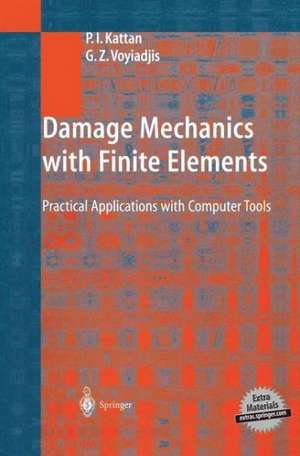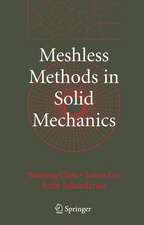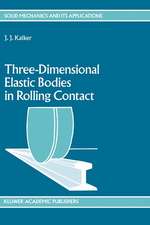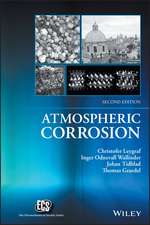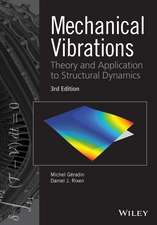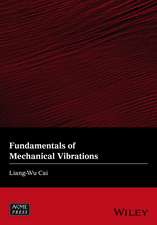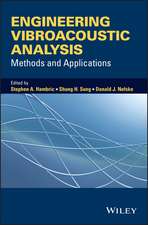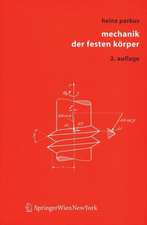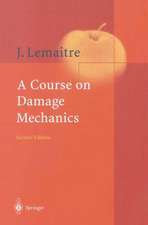Damage Mechanics with Finite Elements: Practical Applications with Computer Tools
Autor P.I. Kattan, G.Z. Voyiadjisen Limba Engleză Paperback – 30 oct 2012
| Toate formatele și edițiile | Preț | Express |
|---|---|---|
| Paperback (1) | 632.05 lei 6-8 săpt. | |
| Springer Berlin, Heidelberg – 30 oct 2012 | 632.05 lei 6-8 săpt. | |
| Hardback (1) | 638.24 lei 6-8 săpt. | |
| Springer Berlin, Heidelberg – 24 sep 2001 | 638.24 lei 6-8 săpt. |
Preț: 632.05 lei
Preț vechi: 743.59 lei
-15% Nou
Puncte Express: 948
Preț estimativ în valută:
120.98€ • 131.46$ • 101.69£
120.98€ • 131.46$ • 101.69£
Carte tipărită la comandă
Livrare economică 21 aprilie-05 mai
Preluare comenzi: 021 569.72.76
Specificații
ISBN-13: 9783642626753
ISBN-10: 3642626750
Pagini: 124
Ilustrații: X, 113 p.
Dimensiuni: 155 x 235 x 7 mm
Greutate: 0.19 kg
Ediția:Softcover reprint of the original 1st ed. 2002
Editura: Springer Berlin, Heidelberg
Colecția Springer
Locul publicării:Berlin, Heidelberg, Germany
ISBN-10: 3642626750
Pagini: 124
Ilustrații: X, 113 p.
Dimensiuni: 155 x 235 x 7 mm
Greutate: 0.19 kg
Ediția:Softcover reprint of the original 1st ed. 2002
Editura: Springer Berlin, Heidelberg
Colecția Springer
Locul publicării:Berlin, Heidelberg, Germany
Public țintă
ResearchDescriere
The major goal of this book is to present the implementation of some damage models with finite elements. The damage models are based on the principles of continuum damage mechanics and the effective stress concept. Several books have appeared recently on damage mechanics but are mostly theoretical in nature. Alternatively, this book provides a complete finite element program that includes the effects of damage. The book consists of two parts. Part I includes two chapters mainly review ing topics from finite element analysis and continuum damage mechanics. The reader is cautioned that the material contained in this part is introductor- other references must be consulted for the theoretical aspects of these topics. For a complete theoretical treatment of the subject, the reader is referred to the book Advances in Damage Mechanics: Metals and Metal Matrix Composites by Voyiadjis and Kattan, published in 1999. In Part II the finite element program DNA is introduced in three chapters. DNA stands for "Da mage Nonlinear Analysis". The program can be used for the analysis of elasto plastic material behavior including the effects of damage within the frame work of damage mechanics. Two versions of DNA are presented - one for small strain analysis and one for finite strain analysis. The program makes extensive calls to a library of tensor operations developed by the authors. The tensor library is extensively outlined in the last chapter of the book.
Cuprins
1 Damage Mechanics.- 1.1 Review of Continuum Damage Mechanics.- 1.2 Decomposition of the Damage Variable in One Dimension.- 1.3 General Decomposition of the Damage Variable in Three Dimensions.- 1.4 Damage of Fiber-Reinforced Composite Materials with Micromechanical Characterization.- 1.4.1 Definitions and Assumptions.- 1.4.2 Composite Analysis.- 1.4.3 Damage Analysis.- 1.4.4 Constitutive Equations.- 1.4.5 Evolution of Damage.- 1.4.6 Example — Uniaxial Tension of a Unidirectional Lamina.- 1.4.7 Example — A Unidirectional Lamina Under Plane Stress.- Exercises.- 2 Finite Element Damage Analysis of Plate Bending.- 2.1 Introduction.- 2.2 Ductile Plastic Damage in Plate Bending Problems.- 2.2.1 Ductile Plastic Damage of Beams.- 2.2.2 Ductile Plastic Damage of Plate Bending.- 2.3 A Damage Node Model for Ductile Plastic Damage of Plate Bending.- Exercises.- 3 Using DNA.- 3.1 Installing DNA.- 3.2 Running DNA.- 3.3 Installing Ghostscript and GSView.- 3.4 Viewing the Finite Element Mesh and Contours.- 3.5 Installing the DNA Windows Interface.- 3.6 Using the DNA Windows Interface.- 3.7 Example 1 — Plane Strain Problem in Plasticity.- 3.8 Example 2 — Elastic Cantilever with Two Elements.- 3.9 Example 3 — Center-Cracked Plate Under Uniaxial Tension.- 3.10 Compiling and Building the DNA Executables.- Exercises.- 4 DNA Commands.- 4.1 Command Reference.- 4.2 Library of Finite Elements in DNA.- 5 The Tensor Library.- 5.1 Introduction.- 5.2 Fortran Source Code.- References.- of the Accompanying CD-ROM.
Recenzii
From the reviews of the first edition:
"The major goal of the book is to present the implementation of damage models within the finite element method. … The book and the program offer a playful access to damage mechanics with finite elements for students … . As the source code is available, individual modifications are possible which may open creative interactions with the program." (Technische Mechanik, Vol. 22 (3), 2002)
"This book presents recent research on damage mechanics with finite elements. … This textbook for graduates and researchers in civil, mechanical, aerospace engineering and materials science deals with the practical applications of damage mechanics, which have not appeared before in the literature." (European Journal of Mechanical and Environmental Engineering, Vol. 47 (1), 2002)
"The major goal of the book is to present the implementation of damage models within the finite element method. … The book and the program offer a playful access to damage mechanics with finite elements for students … . As the source code is available, individual modifications are possible which may open creative interactions with the program." (Technische Mechanik, Vol. 22 (3), 2002)
"This book presents recent research on damage mechanics with finite elements. … This textbook for graduates and researchers in civil, mechanical, aerospace engineering and materials science deals with the practical applications of damage mechanics, which have not appeared before in the literature." (European Journal of Mechanical and Environmental Engineering, Vol. 47 (1), 2002)
Textul de pe ultima copertă
--------------------------------------------------------- This book presents recent research on damage mechanics with finite elements. Particular emphasis is laid on programming the finite element method to incorporate applications of da- mage mechanics. This textbook for graduates and researchers in civil, mechanical, aerospace engineering and materials science deals with the practical applications of damage mechanics, which have not appeared before in the literature. The book contains research on the separation of voids and cracks in continuum damage mechanics. An educational version of a finite element program for damage mechanics is included on a CD-ROM.
Caracteristici
Textbook for graduates and researchers in civil, mechanical, aerospace engineering and materials science
Deals with the practical applications of damage mechanics which have not appeared before in the literature
CD-ROM contains an educational version of a damage-FEM program
Includes supplementary material: sn.pub/extras
Deals with the practical applications of damage mechanics which have not appeared before in the literature
CD-ROM contains an educational version of a damage-FEM program
Includes supplementary material: sn.pub/extras
